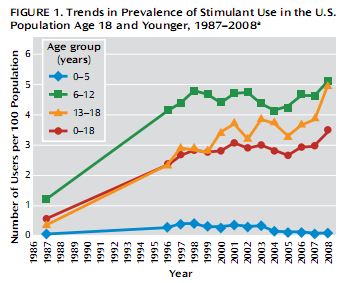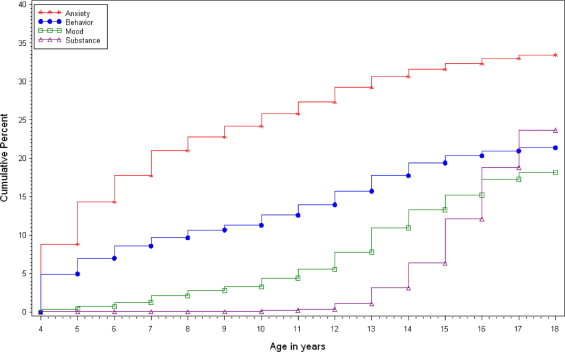October 7, 2011
Recent Trends in Stimulant Medication Use Among U.S. Children

is this a joke?
A study, Recent Trends in Stimulant Medication Use Among US Children finds, surprisingly, that 3.5% of kids under 18 got stimulants, vs. 2.4% in 1996. Holy crap!! The reason this is surprising is that 3.5% is about 10x smaller than I thought it was. American Journal of Psychiatry? Did I move to Romania?
Then the article informs me that I am both racist and color blind: most stimulants are going to white kids (4.4%), not black kids (3%), and about hispanics I was WAY off, I was certain the number was close to 133% but apparently it's only 2.1%. Huh? Does this study include the 48 states of America that have Americans in them, or just Guam and parts of the Virgin Islands?
The article pretends to be shocked by this "steep increase," and then tries to explain it by putting some nouns and verbs next to each other hoping you'll be impressed:
That last sentence, referenced with "(15)", sounds like the conventional wisdom I heard in residency: "African-Americans don't like to admit depression", excluding those in the packed waiting room. (1) But when I eventually (2) found study "(15)" I was totally not surprised to find it did not say parents are less likely to report ADHD. "(15)" was a survey of parents asking them if they had been told by a doctor or school that their kid had ADHD.
The reason that 3.5% of kids are on stimulants is that their doctor neglected to give them Risperdal. The kid who got Ritalin at age 6 and it helped carried that Ritalin into the teen years, hence the growth among adolescents; but any new kids coming through the pipe don't get stimulants, they get something else, by which I mean everything else.
Note the big jump at 6 years old, from 0.1% to 5.1%. Yes, certainly symptoms become more prominent, but also they become prominent at school; schools have an interest in medicalizing the problem, both practically (calm that kid the hell down) educationally (diminished expectations) and economically (schools get more funding.) Stimulants are the natural first line drugs. Well, they were, anyway.
This ridiculous article pretending to be amazed at the increase in stimulants is there to prevent the heart attack you'd experience if you looked at another study that has a graph in it:

Unless you believe bisphenol-A or global warming is changing the genetics of kids born after 1990, then the correct and terrifying way to interpret this graph is that one in every four kids is considered by adults to be in need of psychiatric treatment; and only 3.5% get put on stimulants. The other 20% we can assume are receiving psychoanalysis.
Maybe they need the meds, maybe they don't, the question is if these are the same kinds of organ donors that existed in 1896, what happened to them before psychiatrists? Did they eat each other? And if they are, in fact, more "psychiatric" than they were in 1896 and bisphenol-A isn't to blame, then what is the other possibility?
And as that huge number of psychiatric patients grow up to become either unemployed adults, or at least the children of unemployed parents, will they
a) experience spontaneous and permanent remission of symptoms
b) be treated with psychoanalysis
c) .....
-------
1. The conventional wisdom is backwards. The black patient isn't resistant to admitting he has depression, he is resistant to the white doctor's attempt at labeling him depressed, and consequently marginalizing him, diverting attention away from the social factors over which the doctor is nervous to discuss and powerless to change. "You have depression" is the nimble dance around the question of whether a white doctor can understand a black patient's life. It is a delicate thing to say to a black woman that perhaps her man isn't worth a damn, as she just said out loud to you but you're not sure if you're allowed to echo back, maybe these kind of relationships are culturally appropriate? It's tough to know when most of your information about black people comes from Martin Luther King quotes and The New Yorker.
Lacking any common language to bridge racial, economic, or sexual divides, clinicians hide behind the invented terminology of psychiatry. Medications become the physical manifestation, the proof, that the language is real.
2. Whenever I see a reference to a statement that seems insane to me, two things will be true:
See also: The Rise And Fall Of Atypical Antipsychotics
Then the article informs me that I am both racist and color blind: most stimulants are going to white kids (4.4%), not black kids (3%), and about hispanics I was WAY off, I was certain the number was close to 133% but apparently it's only 2.1%. Huh? Does this study include the 48 states of America that have Americans in them, or just Guam and parts of the Virgin Islands?
The article pretends to be shocked by this "steep increase," and then tries to explain it by putting some nouns and verbs next to each other hoping you'll be impressed:
The significant increase in stimulant utilization in racial and ethnic minorities and low-income families indicates an increased recognition of ADHD... social and cultural factors continue to play a significant role in ADHD treatment utilization. Parents of Hispanic and African-American children are less likely to report ADHD than parents of white children...(15)
That last sentence, referenced with "(15)", sounds like the conventional wisdom I heard in residency: "African-Americans don't like to admit depression", excluding those in the packed waiting room. (1) But when I eventually (2) found study "(15)" I was totally not surprised to find it did not say parents are less likely to report ADHD. "(15)" was a survey of parents asking them if they had been told by a doctor or school that their kid had ADHD.
The reason that 3.5% of kids are on stimulants is that their doctor neglected to give them Risperdal. The kid who got Ritalin at age 6 and it helped carried that Ritalin into the teen years, hence the growth among adolescents; but any new kids coming through the pipe don't get stimulants, they get something else, by which I mean everything else.
Note the big jump at 6 years old, from 0.1% to 5.1%. Yes, certainly symptoms become more prominent, but also they become prominent at school; schools have an interest in medicalizing the problem, both practically (calm that kid the hell down) educationally (diminished expectations) and economically (schools get more funding.) Stimulants are the natural first line drugs. Well, they were, anyway.
This ridiculous article pretending to be amazed at the increase in stimulants is there to prevent the heart attack you'd experience if you looked at another study that has a graph in it:

Unless you believe bisphenol-A or global warming is changing the genetics of kids born after 1990, then the correct and terrifying way to interpret this graph is that one in every four kids is considered by adults to be in need of psychiatric treatment; and only 3.5% get put on stimulants. The other 20% we can assume are receiving psychoanalysis.
Maybe they need the meds, maybe they don't, the question is if these are the same kinds of organ donors that existed in 1896, what happened to them before psychiatrists? Did they eat each other? And if they are, in fact, more "psychiatric" than they were in 1896 and bisphenol-A isn't to blame, then what is the other possibility?
And as that huge number of psychiatric patients grow up to become either unemployed adults, or at least the children of unemployed parents, will they
a) experience spontaneous and permanent remission of symptoms
b) be treated with psychoanalysis
c) .....
-------
1. The conventional wisdom is backwards. The black patient isn't resistant to admitting he has depression, he is resistant to the white doctor's attempt at labeling him depressed, and consequently marginalizing him, diverting attention away from the social factors over which the doctor is nervous to discuss and powerless to change. "You have depression" is the nimble dance around the question of whether a white doctor can understand a black patient's life. It is a delicate thing to say to a black woman that perhaps her man isn't worth a damn, as she just said out loud to you but you're not sure if you're allowed to echo back, maybe these kind of relationships are culturally appropriate? It's tough to know when most of your information about black people comes from Martin Luther King quotes and The New Yorker.
Lacking any common language to bridge racial, economic, or sexual divides, clinicians hide behind the invented terminology of psychiatry. Medications become the physical manifestation, the proof, that the language is real.
2. Whenever I see a reference to a statement that seems insane to me, two things will be true:
- It will take me as long to get the study as it did to conduct the study, i.e. 45 minutes. No hyperlink. No free access. Then I have to go into the university's PubMed, which takes me through three windows to Science Direct or some other outlet. Why, oh why, can't I just click "(15)" in the original paper and immediately see it? Because:
- It will turn out to be actually insane, and the only part of the reference that will support the statement will be the title.
See also: The Rise And Fall Of Atypical Antipsychotics
40 Comments